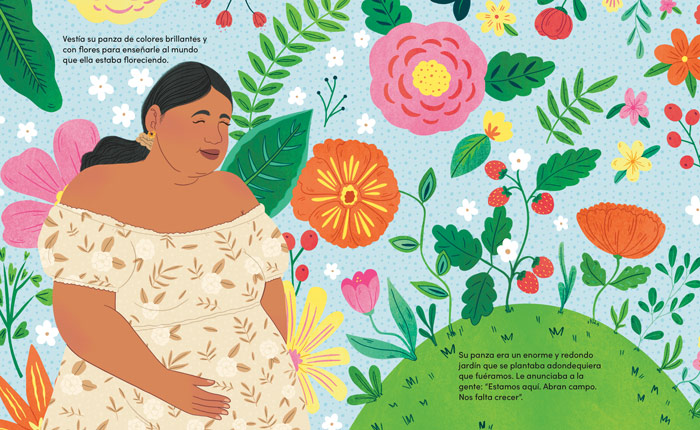Aida Salazar on the Art of Translation, Truth, and the Language of Lyricism | The 2024 Stars Issue
Gifted translators are not celebrated as often as authors or illustrators, but their work is vital to a book's success. SLJ profiles Aida Salazar, the award-winning author who also translated this year's starred book La panza de mamá by Isabel Quintero.
|
Spread from La panza de mamá |
Also read:Chaaya Prabhat: A Versatile Illustrator with a Whimsical Streak 
|
Readers might recognize Aida Salazar’s name as the author of award-winning middle grade novels, such as The Moon Within and The Land of the Cranes, and even her most recent Caldecott Honor winner, Jovita Wears Pants, illustrated by Molly Mendoza (2019, 2020, 2023, all Scholastic). But Salazar wears another hat in the children’s publishing sphere. She’s also a translator of books, including Isabel Quintero’s La panza de mamá, the Spanish-language edition of Mama’s Panza (both Penguin, 2024)—both SLJ stars. The picture book by Morris Award–winning Quintero, illustrated by Iliana Galvez, is about a little boy who expresses his appreciation of the comfort of his mother’s belly. It is a tribute to mother’s bodies and all the love and security that can be found there.
Salazar’s journey into translating happened in the most unexpected of ways. During the pandemic, a publisher requested that she translate Peace by Miranda Paul and Paul Baptiste (NorthSouth, 2021), an ode to peace, from English to Spanish. “They asked me to translate this 300-word poem in rhyme, which was a huge, beautiful puzzle and an incredible challenge,” says Salazar.
 |
Aida Salazar |
At the same time, her former editor from Scholastic, Nick Thomas, approached her with a project translating a Colombian novella, Neverforgotten by Alejandra Algorta, into English. She found that to be a more natural process, because she’s published all of her children’s books in English. “I felt deeply moved by it, because it comes from that Latin American tradition in which poetry is infused in everything we write,” Salazar says. “That’s the art of translating; you also have to be a poet. You have to understand the language of lyricism.”
When Salazar was approached to translate Mamá’s Panza, she was immediately drawn to the assignment. The text reminded the translator of her own mother’s panza and how each of her six siblings would fight to be the one who would rest their heads on it. “When I read the text, I started crying. I was so moved by the sweetness, the sensitivity,” she says. The work recalled those times together as family, surrounded by comfort and love. “It felt really important for me to it do justice,” says Salazar.
Creating this work, which celebrates all bodies, involved the collaboration required for translated books, including author, illustrator, Spanish-language copyeditor, translator, and bilingual editor.
The editor of the English-language edition, Joanna Cardenas, also edited the Spanish edition, and Salazar found it helpful to work with someone who could straddle both worlds. It was especially relevant when deciding to keep the Spanglish structure in the narrative.
“We could finesse the language and make it a truly Chicane story,” says Salazar. “Those are the types of choices that are rooted in culture. I just felt that it was really important to stay true to the essence of how it was originally written in English and Spanglish.”
When it came to translating her own work, Jovita Wore Pants, a picture book biography about a Mexican folk hero who is one of Salazar’s ancestors, she was primed to be an advocate for staying faithful to the localized Spanish of the tale’s region because the story was so close to home. She leaned into the colloquial Spanish native to her family’s town in Mexico, while also making sure not to alienate Spanish-language readers unfamiliar with her dialect.
Translation is “about tapping into the heart and the vibe of the story or the poem or the phrase, and then trying to communicate that in another language,” Salazar says. “It’s been a beautiful learning curve and experience.”
Shelley M. Diaz is the SLJ reviews director.
RELATED
The job outlook in 2030: Librarians will be in demand
The job outlook in 2030: Librarians will be in demand
ALREADY A SUBSCRIBER? LOG IN
We are currently offering this content for free. Sign up now to activate your personal profile, where you can save articles for future viewing







Add Comment :-
Be the first reader to comment.
Comment Policy:
Comment should not be empty !!!